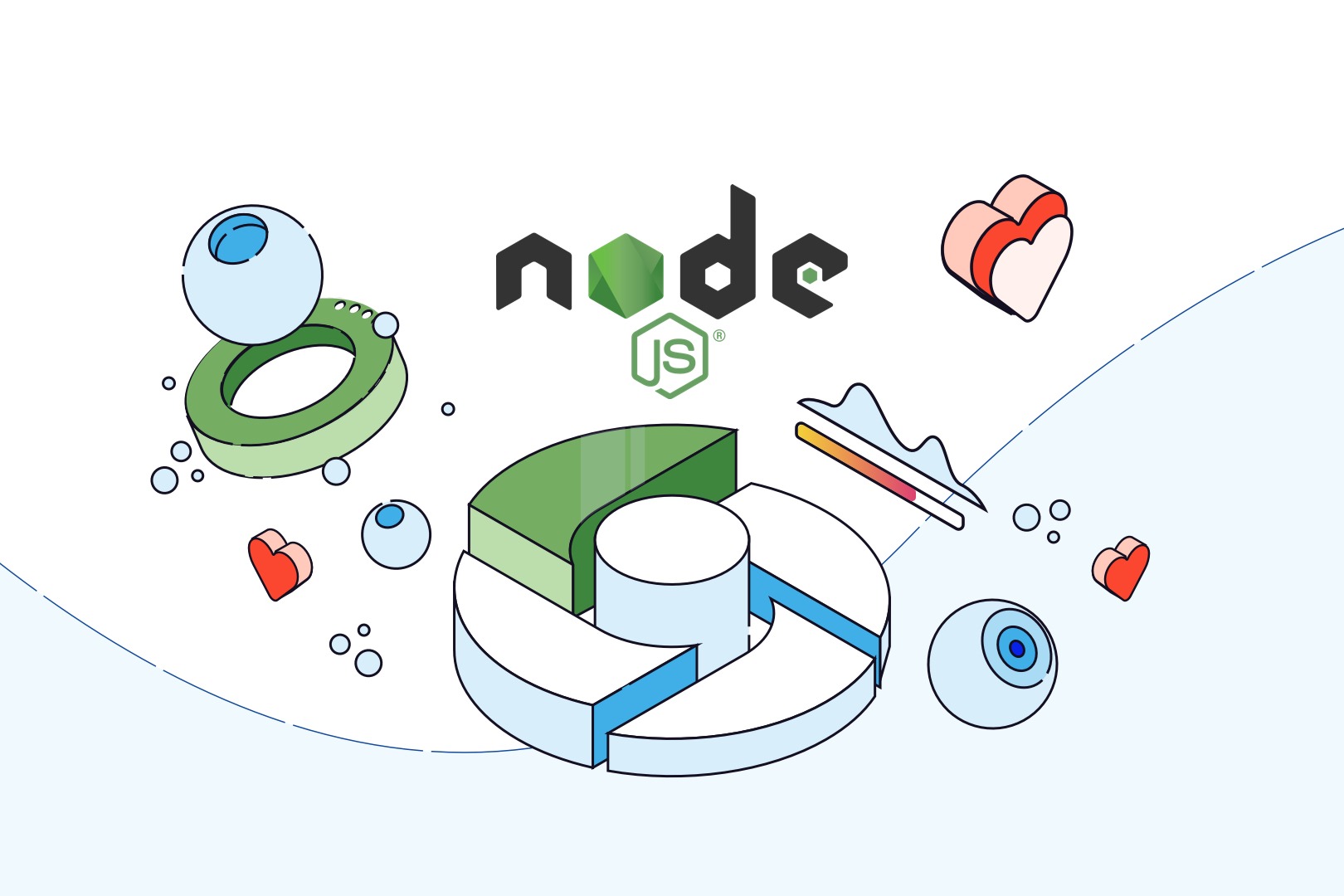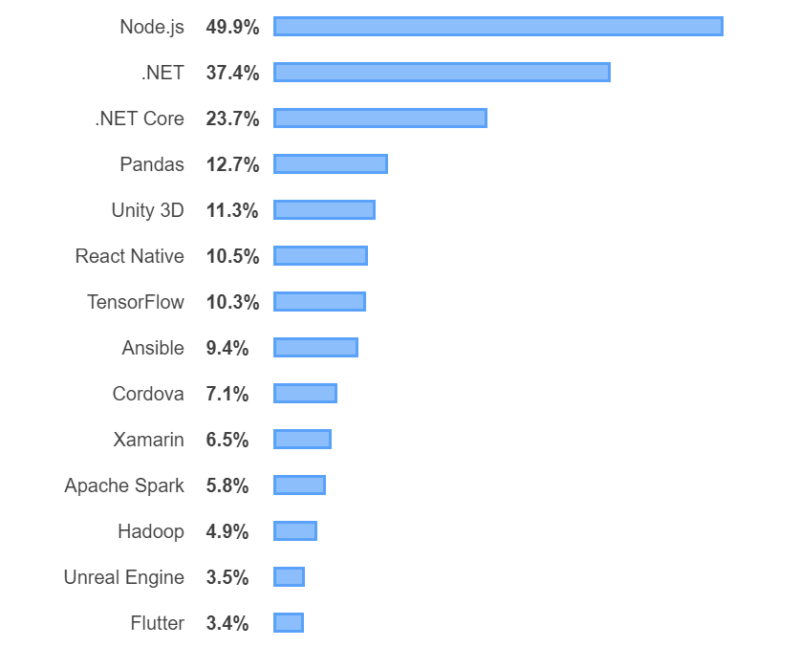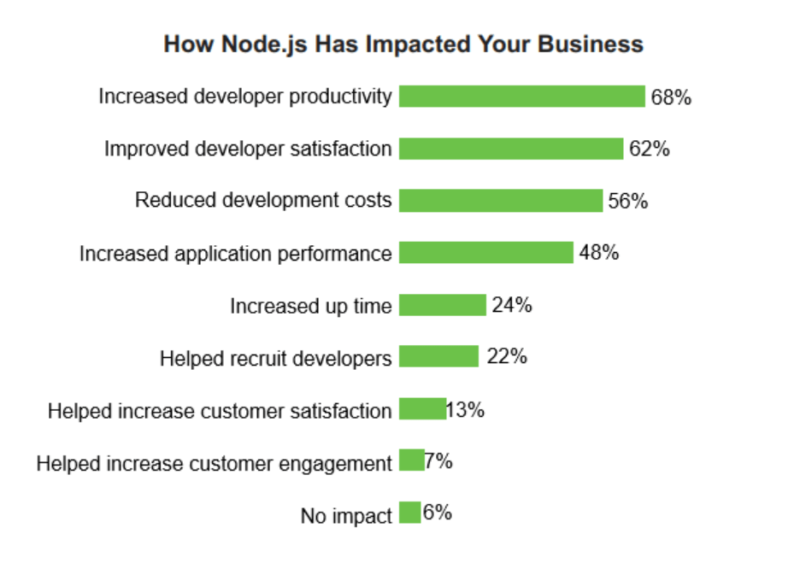13 June 2023
Why use Node.js for web development? Scalability, performance & other benefits of Node.js based on famous apps

Don’t you sometimes feel that JavaScript these days is kind of everywhere on the web? No matter the size, industry, or purpose of the app, the odds of finding JavaScript as well as JavaScript-related frameworks and libraries there are extremely high. Of course, JavaScript has always been the language of the web, but it was true only for the frontend. It was Node.js that really made JavaScript so ubiquitous. But why? In this article, I’m exploring in-depth the reasons behind Node.js’s ability to attract both developers and businesses.
Node.js is easily one of the biggest sweethearts of backend development. It’s widely used especially in the U.S. in the start-up kingdom of Silicon Valley. It’s no wonder that over 175,398 web apps (some of them being THE biggest players on the market) already put Node.js on their backend.
What you’ll learn
In this article, I’ll check out the benefits of Node.js web development and present each enterprise and well-known company that use this web framework and answer a burning question – why use Node.js in your software project? In particular, you will find out:
- what Node.js really is in the context of modern web development,
- key Node.js use cases, including APIs, streaming web applications, real-time web applications, microservices, and command line tools,
- an in-depth analysis of why Node.js is the right choice for scalability-oriented businesses,
- practical overview of other Node.js benefits, such as the ability to use one programming language for the whole system, reusability, or non-blocking I/O paradigm,
- stories of famous Node.js-based companies (not just Netflix!).
Hey, ho, let’s go!
What is Node.js?
The Node.js platform is a server side runtime environment based on the JavaScript code.
It simply means that you can decide on backend development being written in Javascript.
Which is good news because now developers are able to use the same solution for both frontend and backend server side web development. We’ll talk more about what Node.js is used for later.
Node.js was created in 2009 by Ryan Dahl. By the end of the year, it premiered at European JSConf. Node.js combined Google’s V8 JavaScript engine, an event loop, and a low-level I/O API. In the beginning, it was only available on Linux and Mac OS, however, the Windows version was introduced three years later.
What began as a small initiative, is now one of the open-source web frameworks with MIT licence, supported by a massive community of Node js developers and hundreds of add-ons. Not to mention the software development community that amongst many technologies available, still decide to learn Node.js for web development. According to Stack Overflow 2019 survey, Node.js is now the most popular tool in “Frameworks, Libraries, and Tools” category with 50% of answers!

Node.js services are getting started to be more and more popular, hence why they get something new all the time. A software engineer can absolutely count on a brand new release at least twice a year. The current Node.js 20 version was made available in April 2023. October 2023 is the month of entering the LTS status for this release. We’ve already described the new Node.js 20 features (client side / web server) on our blog. The same article also features detailed information and code snippets that cover previous releases all the way to ver. 12.
What is Node.js used for?
Okay, you’ve got the basic. Now let’s get into details and take a look at what make Node.js features so appealing for developers and software companies around the world?
API
Nowadays, it’s the most popular type of application. Nearly all web applications need some kind of backend to communicate with databases or other external services. Thanks to the big community, you can easily find a library to create e.g. REST or GraphQL API. In the past, using Node.js was recommended only for applications with a low number of CPU-intensive operations. Since release version 10.5.0 you can use worker threads to do it.
💡 Do you want more practical Node.js content based on our experience from real-life projects? Check out these:
- A simple guide to JavaScript concurrency in Node.js and a few traps that come with it
- Build scalable Node.js apps faster with this boilerplate
- Elasticsearch tutorial for beginners. Take your first steps and learn practical tips with Node.js specialist
- Honey, I shrunk the node_modules! ...and improved app’s performance in the process. On node module size
- PHP vs Node.js: how to choose. CTO’s guide
Streaming web applications
Every day we use streaming services for listening to music or watching videos. Without downloading the content, we can binge your favourite TV series just on the internet. Is Node.js a good choice to stream data? Of course! It has built-in streams module allowing you to process a huge amount of data in chunks, sequentially. Thanks to this, you don’t have to temporarily store or cache data in your application memory at all. Also, you can work on chunks while streaming, so e.g. encoding a video won’t be a problem for a client anymore.
Real-time web applications
Because Node.js is one of the technologies that’s great at handling lots of I/O operations, you can use it to build real-time web applications, for example, a chat room where people can talk to each other in real-time. Or maybe a collaboration tool, where co-workers will work on the same document at the same time. Done! Building a video conference node.js application also won’t be a problem. It is possible thanks to Node’s Events API and WebSockets. Node js in web development is like a fish in water!

Do you want to develop or upgrade a successful streaming service or a real-time web app?
Our portfolio is full of similar projects based on Node.js. Check out our previous projects and write a successful story with us too!
Microservices
Recently, this approach in application development has become very popular. Because of the lightweight nature of Node.js, it is easy to make your solution scalable. Node.js is our technology of choice for building and deploying microservices. And it’s not only The Software House – a lot of companies migrate to Node.js when they want to move to the microservices. You can see it for yourself in our State of Microservices 2020 report.
Command Line Tools
With a huge number of available packages in Node Package Manager (NPM), you can easily create simple and also more advanced command-line tools suited for your requirements.
💡 Read more:
Why using Node.js is great for business? Scalability!
You already know why technical folks fall in love with Node.js. Now it’s time to explain, why Node.js is so appealing for business.
Node.js is a super-fast, high-performance and lightweight web framework, ideal for asynchronous side programming. With Node.js you are able to execute multiple actions at the same time. What’s more, you can advantage from serverless and have your pick from various cloud computing models and providers like Amazon Web Service or Google Cloud Platform.
If you want to see how Node.js and serverless work in practice, check out:
Node.js allows you for better scalability, improved performance and optimised costs. Your team will save loads of time by using reusable, ready-to-run components of node modules. As far as the team is concerned, you can scale it as well depending on what resources you need at the moment – just like your company starts small and then grows.
It may not be THE most popular web framework (yet) but Node.js has definitely dominated other frameworks in the traffic aspect. According to the Web Technology Surveys, node js web development is behind websites with extremely high traffic (as you’ll later see in the examples). You can see it in the graph below.

Would you like your company to benefit from using Node.js? 🚀
As you can guess from reading this article, we’ve got the first-hand experience in using this technology. Schedule FREE software consultations to find out how our developers can help you.
Benefits of Node js development
I can talk about the Node js advantages for ages. We don’t have that much time, you want to develop your project after all. I’ll talk about the most important benefits of Node.js that, from my experience as a Node.js developer, are true blessings for both business and software development.
- Open-source NPM repository – with over 60 thousand available modules you can easily find a ready to use solution for your problem, instead of reinventing the wheel.
- Scalable systems – thanks to the lightweight nature of Node.js it’s really easy to scale the application horizontally by deploying many instances of your project to the different servers. You can also scale your system vertically, by using a cluster built-in module that will fork the application process to all the CPU cores you have.
- Good for microservices – we’ve talked about this before but it’s still worth mentioning that a lot of companies migrate to Node.js when they want to move to the microservices. Just sayin’.
- Single programming language – nowadays, amongst frontend programming languages the most popular choice is the JavaScript language. Because you can also use it on backend thanks to Node.js runtime environment’s JavaScript execution, it improves the app’s maintainability. You no longer have to hire two people for separate backend and frontend positions. All of your major pieces of software can be served by open-source JavaScript frameworks. It’s a huge advantage to save your time and money.
- Non-blocking I/O paradigm – the main problem with I/O operations is waiting for a response. Because Node.js is one-threaded, waiting for database query will block the entire application. That’s why you should use a non-blocking API. After calling it, the thread can continue working on another task. When the I/O operation will be completed, you will be notified about it by a callback. The main advantage and result of this approach are improved efficiency by handling a lot of simultaneous connections. The efficiency of Node.js is further improved by compiling its code to machine code.
- Reusable code – because JavaScript is the main choice within programming languages, you can easily share parts of code between different components in your system. What is more, you can use the same parts of code both on the frontend and backend.
- Time to market – very often a business has a great idea for a web application but needs to verify it on a market. With Node.js you can deliver an MVP very fast which reduces the amount of money and effort needed to achieve it.
- Tested on production – since Node.js was created in 2009 a lot of companies have had an opportunity to check how Node.js works on production. Well, it worked quite well because a lot of big players decided to move to Node.js.
Just so you know, I’m absolutely not making this up. The research “Node.js User Survey Report” speaks for itself. Node.js advantages business in many ways. As you can see below, Node.js benefits have a positive impact not only on the products but also on costs, team culture, morale, customer satisfaction and so on.

I think it’s high time you meet those big market players who adopted Node.js in their products.
Which companies decided on using Node.js in their web applications?
📺 Netflix
One of the biggest and most popular streaming service in the world with nearly 183 million subscribers in 2020. It’s no joke when you have to find a scalable solution to handle 1 billion hours of weekly video data streaming, not to mention other requests. Netflix was getting more popular and startup time (and the web application in general) was getting slower. Netflix chose Node.js because their developers have already been working in JavaScript so they didn’t need to learn anything new (two birds with one stone) and they loved what Node modules had to offer.
I hope you’re sitting because here come the numbers. By introducing Node.js, Netflix managed to lower their startup time from 40 minutes to under 1 minute!
💸 PayPal
Worldwide PayPal has over 325 million active accounts. The first quarter of 2020 marked PayPal’s net payment volume – 190.57 billion USD with 3.26 billion online transactions. You have to admit, those numbers are overwhelming.
PayPal decided on Node.js to build those parts of the web application that are seen by the end-users. Another Node.js advantage they benefit from is the unified team of developers working in JavaScript since both the browser and server applications are written in JavaScript. By using Node.js, PayPal’s development team slimmed down and speeded up the app adding modularity to it.
Effect? Introducing Node.js doubled the number of requests PayPal could handle per second, and page response time is 200ms faster.
In 2016 Microsoft acquired LinkedIn for the mind-blowing price – 26 billion USD and by 2020, LinkedIn had over 675 million users on board.
As far as the mobile server is concerned, Node.js is entirely Node-based. The LinkedIn team decided that two particular Node.js benefits were crucial for their project – easy scaling and communication with other services (the mobile LinkedIn app talks to the platform’s API and databases).
🚕 Uber
Available in 65 countries and 600+ cities, Uber completes over 14 million trips daily. Overall, nearly 4 million Uber drivers have already driven passengers to their destinations over 10 billion times worldwide. I guess we don’t think about the scale when we order an Uber home after a night out…
In order to handle millions of notifications, passengers-drivers matches and requests daily, Uber needed a really fast and scalable solution. They decided on using Node.js because it processes a lot of information quickly and it’s possible to inspect and change a program and fix the necessary error without restarting the app. Now, the Uber development team can write and deploy new code and fixes when needed.
🔎 Groupon
In 2020, deal site Groupon had over 200 million mobile app downloads and 41.8 million unique customers who had bought at least one deal in a year.
After switching from Ruby on Rails, the Groupon development team noticed a lot of Node.js benefits – 50% faster loading time, using less hardware for the same amount of traffic, developing and implementing features much faster without depending on other engineering teams.
🛒 eBay
182 million users in 190 countries with the US being the dominant market (35% of all US mobile users use eBay mobile app!).
That insane amount of traffic required scalable, fast and stable solution. By transferring to Node.js, eBay wanted to reach two goals: make their app as real-time as possible, and connect and configure eBay services that display any information for end-users. Needless to say, goals were achieved.
🚀 NASA
Last but not least, Node.js may not be rocket science but it definitely helped rocket scientists. NASA is probably one of the most important organisations in the entire world ever (The Milky Way galaxy? Universe?) and surely recognises a useful technology when it sees one. It so happens, that Node.js actually saves human life in outer space.
During a spacewalk in 2013, astronaut Luca Parmitano almost died when water started leaking into his helmet.covering his eyes, ears and nose. Luckily, his colleague Chris Cassidy was there to escort him to safety. After that, NASA halted all spacewalks and investigated what happened.
The NASA team was already writing JavaScript, so choosing Node.js was basically centring around a single platform. This lowered the time and cost of development. Other Node.js benefits that NASA praised were asynchronous event loop for I/O operations for cloud-based databases and npm that pairs with Docker to create a microservices architecture where each API, function and application operates smoothly and independently.
Now, according to “Node.js Helps NASA Keep Astronauts Safe and Data Accessible” case study, “The system […] uses a microservices architecture with separate APIs and applications built in Node.js to move data related to the EVA spacesuits from three separate legacy databases to a cloud database. Now users can query that one database for everything, reducing the time to access a comprehensive set of data by about 300%.” Safety first!
3... 2... 1... Liftoff!
Of course, the list is not complete. Other notable companies using Node.js include Twitter, Medium, Wall Street Journal, Aliexpress, Tumblr, Github, BBC, Home Depot, IBM, Coursera, Mastercard, Trello, Pinterest, Sony, Siemens, BMW, Target, Airbnb, Walmart, Mozilla, Wikipedia, The New Yorker, Change.org.
Why use Node.js app development in your next project?
As you can see, Node.js is really powerful and more and more companies every day learn to use to its full extent to develop efficient and scalable Node js applications. Now you know that:
- the use cases of Node.js happen to cover some of the most popular and innovative types of application on today’s market,
- Node.js is great in terms of scalability, because you can easily reuse code, develop independent microservices, or scale it up and down based on resource usage; Node.js isn’t the only piece of software that you can do it with, but it does make it easier than other alternatives,
- Node.js development supports time-to-market strategies as it is very easy to get a project off the ground and develop an MVP,
- there are many ways to use Node.js, as evidenced by successful enterprises that made it bigger or lesses part of their stack.
So – have you decided to give Node.js a try?
Get the most out of Node.js with The Software House
Like I’ve mentioned at the very beginning of this article, Node.js is The Software House’s sweetheart. We’ve hired and/or trained over 20 Node.js developers and 10 full-stack programmers which makes it one of the biggest Node.js teams in Poland. And it’s still growing in numbers!
We’re here to assist and advise you 👋
If you’re looking for a reason why use Node.js in your software project, look no further. We can talk about your product during free, 1-hour consultations.

